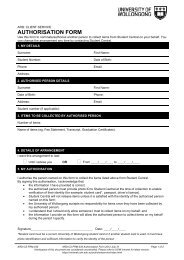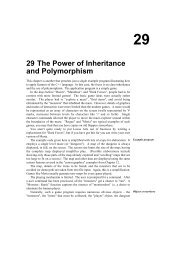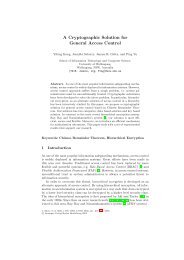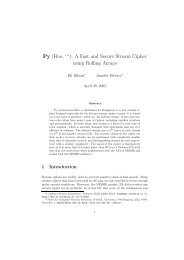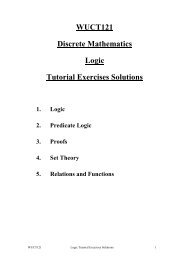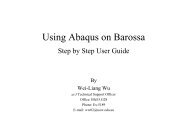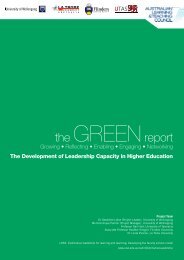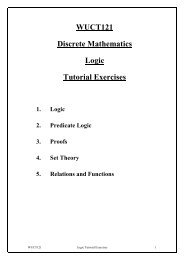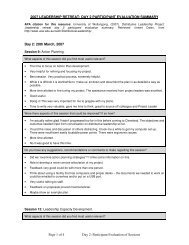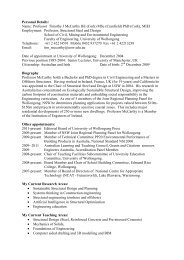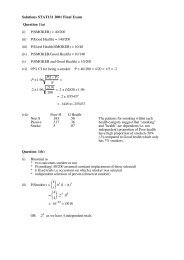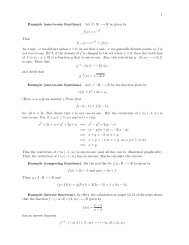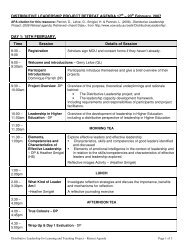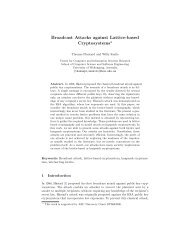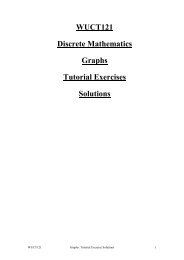india author m 1- a-nan - University of Wollongong
india author m 1- a-nan - University of Wollongong
india author m 1- a-nan - University of Wollongong
Create successful ePaper yourself
Turn your PDF publications into a flip-book with our unique Google optimized e-Paper software.
SYAL, PUSHPINDER.<br />
PRASAD, MADHUSUDAN.<br />
MOHANTY, NIRANJAN.<br />
DAVID, P.C.<br />
INAMDAR, F.A.<br />
SWAIN, RABINDRA K.<br />
DUTTA, UJJAL.<br />
Interview with Norman Simms.<br />
PRASAD, MADHUSUDAN. "'Caught in the Currents <strong>of</strong> Time': A Study in the Poetry <strong>of</strong><br />
Jayanta Mahapatra" in DWIVEDI, A.N ed. Studies in Contemporary Indo-English Verse<br />
Bareilly: Prakash Book Depot, 1984:89-122.<br />
PRASAD, MADHUSUDAN. '"Echoes <strong>of</strong> a Bruised Presence": Images <strong>of</strong> Women in the<br />
Poetry <strong>of</strong> Jayanta Mahapatra" WLWE 28.2 (Autumn 1988):367-78.<br />
PRASAD, S.M. "Quest for Roots in the Poetry <strong>of</strong> Jayanta Mahapatra" Journal <strong>of</strong> Indian<br />
Writing in English 17.1 (1989): 22-32.<br />
RAMAKRISHNAN, E.V. "Landscape as Destiny: Jayanta Mahapatra's Poetry" in DAS,<br />
BIJAY KUMAR ed. Contemporary Indo-English Poetry Bareilly: Prakash Book Depot,<br />
1986: 102-10.<br />
RAMAMURTI, K.S. & SUNDARI, G. "Song <strong>of</strong> the Past: An Interpretation <strong>of</strong> the Poetry <strong>of</strong><br />
Jayanta Mahapatra" Littcrit 10.1 (1984):15-27.<br />
RAO, A.V. KRISHNA. "The Recent Poetry <strong>of</strong> Jayanta Mahpatra: An Assessment"<br />
ACLALS Bulletin 7th Series No. 2 (1986):67-76.<br />
STACHNIEWSKI, JOHN. "Life Signs in the Poetry <strong>of</strong> Jayanta Mahapatra" The Indian<br />
Literary Review 4.2 (1986):79-84.<br />
SWAIN, RABINDRA K. "Life Signs: An Essay-Review" The Literary Endeavour 6.1-4<br />
(1986):133-42. (check date)<br />
TARINAYYA, M. "Jayanta Mahapatra's A Letter to Kazuko Shiraishi in Tokyo: An<br />
Analysis" The Literary Criterion 20.3 (1985): 60-69.<br />
Criticism should move toward the writer’s “conscience” - “the honest desire to be true<br />
to one’s experience <strong>of</strong> the complexities and challenges <strong>of</strong> life”. Mahapatra’s idea <strong>of</strong> the poem<br />
as “testament” has it “breaking forth an experience into a relationship with the reader”. The<br />
reader has difficulty overcoming the initial impression <strong>of</strong> commonness and can find the<br />
language <strong>of</strong> subjective rendering hard too. The private colloquial voice <strong>of</strong> a letter is<br />
transformed by “deautomatizing” image links (rain-hunger) that move us from literal and social<br />
detail to symbolic or metaphysical levels <strong>of</strong> meaning. Spiralling moralising commentary starting<br />
in close reading, seeing the poem as reflecting on civilisation and religion in modern India<br />
(objectified through the eyes <strong>of</strong> the Tokyo addressee) and the poet’s isolation and<br />
responsibility arising from the death by tetanus <strong>of</strong> Mahapatra’s servant girl.<br />
Mahapatra, Laxmi Narayan.



